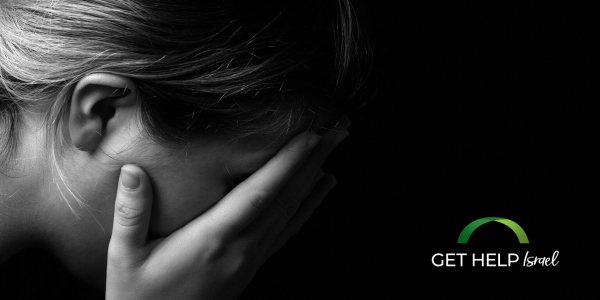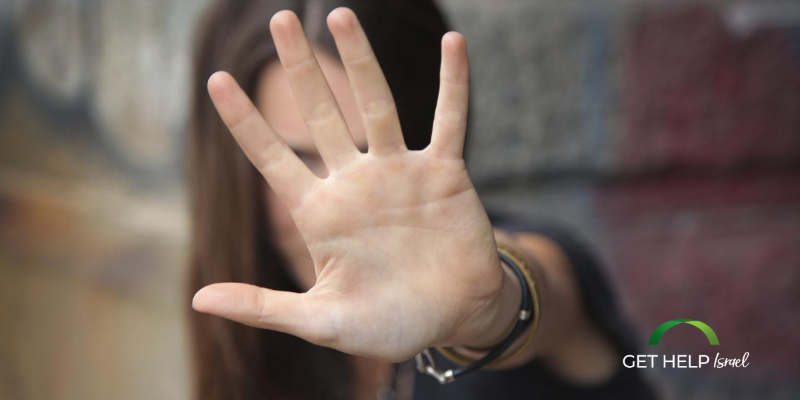The GHI Fund proudly support soldiers, lone soldiers, and active reservists in funding trauma therapy via private practice multilingual therapists to provide imminent specialized care. Soldiers can select their own therapist through our database of participating therapists.

Get Grounded With Art
By: Yannah PopovitzCreative expression can be a soothing and releasing form of self care and help us find our anchor.
Read More.png)
The Flip Side of Stress
By: Sasha WeissResearch has shown that when we are able to regulate our emotions in a stressful situation we are able to not only feel calmer but to also become more collaborative, creative and thrive.
Read More.png)
Resilience Series Part 1
By: Esther Adams AharonyLife is full of good moments, but it isn’t always a smooth ride. There are many ups and downs, such as love and loss, success and struggle, happiness and heartbreak, and joy and trauma. Furthermore, none of us have a road map or a chapter index for our life journeys. Through the next 5 blogs, I will offer a step-by-step science-based approach to help you boost your resilience.
Read MoreFundamentals of Trauma Recovery, Part 8/8
By: Chava LedererBy tackling pieces of your recovery to tackle that are ever-so-small, you ensure your success; this will build greater self-confidence and foundations for each further success.
Read More.png)
Resilience Series Part 2
By: Esther Adams AharonyThe ups and downs of life are associated with a rainbow variety of emotions; some are dark, and some are light. The intensity of these emotions can vary as well. Some of us have dense and opaque emotions when our emotional reactions are high. This increased emotional reactivity can tint everything the same shade or reduce our ability to see beyond these emotions, which may further reduce our ability to cope with adversities. The good news is that we can use a few strategies to keep our emotional reactivity in check, such as grounding ourselves, cultivating somatic skills, and engaging in some mindful physical exercises.
Read More
10 Ways to Improve a Marriage
By: Naomi SternbergWouldn’t it be wonderful if there were just 10 do it yourself fix it solutions…
Read More
Dying at a Distance: Grief During Covid
By: Jeanne LankinHumans are incredibly resilient. I am constantly in awe of the people that I speak to, in my role as a bereavement therapist, who are creating amended rituals to help them cope with their painful losses. There is no correct answer to our predicament. It feels unfair to be deprived of the comfort of our traditions that help guide and heal mourners. However, we can try to creatively engage in meaningful adaptations of our rituals during this crisis to help us process our grief.
Read More.png)
PERFECTIONISM is the Enemy of FREEDOM
By: Tanya ProchkoIt's getting close to Pesach and I'm thinking: what do I want to focus on at my seder table with my adolescent children who can now carry intelligent conversations and think about things in a deeper and more complex way? Afterall, our exodus from Egypt is not just a historical event and with kids, the way to facilitate spiritual connection is through relatable modern-day experiences. The obvious answer would be to focus on what each of us finds ourselves enslaved to in our lives and how we can access our personal freedom, but we've been down that road before and it hadn't hit home the way I'd want a good juicy introspective theme to do. So, I came up with IMPERFECTION
Read More.png)
Challenges of Returning Reserve Soldiers
By: Aharon Herskovitz“Wow, so great you’re home, Aharon, now everything can go back to normal!” This sentence, and variations of it, have been said to me and countless other reserve soldiers over the last few months. Though well-meaning (and also an important injection of optimism and hope!), people’s wider networks are sometimes unaware of the challenges that returning reserve soldiers face.
Read More.png)
Simcha Guilt
By: Elan KartenA therapist reflects on his sleeplessness on the eve of his son's wedding.
Read More
You and Your Body
By: Chava LedererYour body is not all of who you are, but it is a constant. You are in relationship with your body always.
Read More
How to Track Anxiety and Help Resolve It
By: Ruth ShidloWe need our ‘signal’ anxiety, because otherwise, we’d be more vulnerable to danger.
Read More
Fundamentals of Trauma Recovery, Part 7
By: Chava LedererFinding meaning, creating purpose, and gaining control is a recipe that results in greater resilience and fuller recovery.
Read More.png)
The Hidden Layers: A Therapist's Guide to Understanding Trauma
By: Yisroel PickerJust like an onion, trauma has many layers. What you see on the surface is rarely the full story, and true healing often begins when we start peeling back the "how," "who," "where," "when," and "why" behind the "what." This article explores the powerful onion metaphor in understanding trauma, revealing how a deeper look can lead to profound transformation. Discover why exploring every layer is essential for both clinicians and those on their healing journey.
Read More
Beyond Their Words: Understanding the Real Question
By: Yisroel PickerPeter Drucker wisely stated, "The most important thing in communication is hearing what isn't said." This article delves into that profound truth, illustrating how discerning unspoken messages can transform our interactions. We explore the critical skill of understanding the true questions behind the words, from veiled pleas for help to the silent cries hidden in seemingly innocuous inquiries. Discover why truly effective communication requires listening not just to what is spoken, but to the deeper needs and concerns that remain unsaid.
Read More
Simmering Soup: On the Importance of Asking Questions
By: Robin B. ZeigerSometimes the question sits on the back burner like low-simmering stew that has all but been forgotten. An innocent question may ignite a fire in a chilly room and we are off in a new direction. Or sometimes it buzzes around like a nasty mosquito.
Read More
Hope and Healing: From Warsaw to Jerusalem
By: Micki Lavin-PellIt was amazing how the strength of the comradery of the women enabled them to shift their view of themselves and their experience of MRKH from one in which they were hard done by and less of a woman, to feeling special. They were able to explore the possibilities that having MRKH presented to them. They also recognized the hope and possibilities that lay within their situation, on many levels. When the women started the workshop, many were nervous and fidgety. By the end, they were sitting up straight with big smiles on their faces and hope in their eyes.
What I learned was that we can all be hope experts, as we have all experienced life challenges. The more we recognize the challenges that we endured, remove the shame connected to those challenges and celebrate the accomplishments, the better able we can help others feel more hopeful too.
Read More
Ways to Manage Worry Instead of it Managing You – Part THREE
By: Daniel BaumWorry! Ways to Manage Worry Instead of it Managing You
Part Three
Strategies to Help you Manage your Worrying
I am glad you are back again to read the final part of my blog Worry! Ways to Manage Worry Instead of it Managing You. In part three of my blog I will give you some specific strategies to help you manage your worrying.
Here are some specific strategies and tools that can help you avoid toxic worry. Let’s get to it shall we!
Hallowell’s Strategies of Managing Worry

Embracing Transitions: Finding the MAGIC PAUSE Moment
By: Keren BurgmanAutumn is the season of change. I grew up in the Midwest, Chicago. First there…
Read More
Re-Frame Rejection so You Can Successfully Move Forward in Relationships
By: Micki Lavin-PellI have been rejected more times than I can count. By friends, boys, jobs, my kids, you name it… One of my most memorable rejections happened while in 6th grade. My English teacher encouraged us to write a journal, which I kept "hidden" in my desk. In it, I wrote all about a crush I had on a boy named Joey, a fellow classmate. I forgot that in the morning we sat at one desk and in the afternoon another. A fellow classmate found my journal and proceeded to read that very entry aloud to the entire class during recess.
Read More

